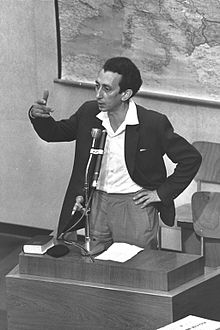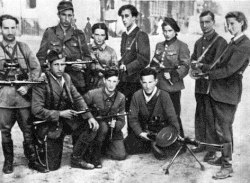User:Marxivi/阿巴·科夫纳
| 阿巴·科夫纳 אבא קובנר | |
|---|---|
 科夫纳在对阿道夫·艾希曼的审判中出庭作证 | |
| 出生 | 1918年3月14日 奥什米亚内 |
| 逝世 | 1987年9月25日(69歲) 以色列恩哈霍雷什基布兹 |
| 国籍 | 以色列 |
| 职业 | 时任 |
| 知名作品 | "《不要像羔羊一样被屠杀!》" |
| 配偶 | 维特卡·肯普纳 |
阿巴·科夫纳(希伯来语:אבא קובנר;1918年3月14日-1987年9月25日)是一位用希伯来语和意第绪语创作的犹太诗人、作家及游击队领袖。 In the Vilna Ghetto, his manifesto (he) was the first time that a target of the Holocaust identified the German plan to murder all Jews. His attempt to organize a ghetto uprising failed, but he fled into the forest, became a Soviet partisan, and survived the war. After the war, Kovner led a secretive organization that aimed to take revenge for the Holocaust by killing six million Germans, but he was arrested by the British before he could carry out his plan. He made aliyah in 1947. Considered one of the greatest poets of modern Israel, he received the Israel Prize in 1970.
Biography
[编辑]Abba (Abel) Kovner was born on March 14, 1918, in Ashmyany.[1] His parents were Rochel (Rosa) Taubman and Israel Kovner. In 1927 he moved with his family to Vilnius, which at this time was part of Poland, where he grew up and was educated at the secondary Hebrew academy and the school of the arts. While pursuing his studies, he joined and became an active member in the socialist Zionist youth movement HaShomer HaTzair. He was a cousin of the Israeli Communist Party leader Meir Vilner.[2]
World War II
[编辑]In June 1941, Nazi Germany invaded the Soviet Union and soon captured Vilnius. Jews were required to live in the Vilna Ghetto, but Kovner managed to escape with several friends to a Dominican convent headed by Anna Borkowska in the city's suburbs. He soon returned to the ghetto.[3] He concluded that in order for any revolt to be successful, a Jewish resistance fighting force needed to be assembled.

At the start of 1942, Kovner released a manifesto in the ghetto, titled "Let us not go like lambs to the slaughter!"[4], although the authorship has been contested.[5] The manifesto was the first instance in which a target of the Holocaust identified that Hitler had decided to kill all the Jews of Europe, and the first use of the phrase "like sheep to the slaughter" in a Holocaust context. Kovner informed the remaining Jews that their relatives who had been taken away had been murdered in the Ponary massacre and argued that it was best to die fighting.[4] Nobody at that time knew for certain of more than local killings, and many received the manifesto with skepticism.[4] For others, this proclamation represented a turning point in an understanding of the situation and how to respond to it. The idea of resistance was disseminated from Vilnius by youth movement couriers, mainly women, to the ghettos of occupied Poland, occupied Belarus and of Lithuania.[6]
Kovner, Yitzhak Wittenberg, Alexander Bogen and others formed the United Partisan Organization ("Fareynikte Partizaner Organizatsye", or FPO), one of the first armed underground organizations in the Jewish ghettos under Nazi occupation.[7] Kovner became its leader in July 1943, after Wittenberg was named by a tortured comrade and turned himself in to prevent an attack on the ghetto.[8] The FPO planned to fight the Germans when the end of the ghetto came, but circumstances and the opposition of the ghetto leaders made this impossible and they escaped to the forests.[9]
From September 1943 until the arrival of the Soviet army in July 1944, Kovner, along with his lieutenants Vitka Kempner and Rozka Korczak, commanded a partisan group called the Avengers ("Nokmim") in the forests near Vilna and engaged in sabotage and guerrilla attacks against the Germans and their local collaborators. The Avengers were one of four predominantly Jewish groups that operated within the command of the Soviet-led partisans.[10]
After the occupation of Vilnius by the Soviet Red Army in July 1944, Kovner became one of the founders of the Berihah movement, helping Jews escape Eastern Europe after the war.
Nakam
[编辑]At the end of the war, Kovner was one of the founders of a secret organization Nakam (revenge), also known as Dam Yisrael Noter ("the blood of Israel avenges", with the acronym DIN meaning "judgement")[11] whose purpose was to seek revenge for the Holocaust.[12][13][14] Two plans were formulated. Plan A was to kill a large number of German citizens by poisoning the water supplies of Hamburg, Frankfurt, Munich, and Nuremberg, Nakam intended to kill 6 million Germans.[15] Plan B was to kill SS prisoners held in Allied POW camps. In pursuit of Plan A, members of the group were infiltrated into water and sewage plants in several cities, while Kovner went to Palestine in search of a suitable poison.[11] Kovner discussed Nakam with Yishuv leaders, though it is not clear how much he told them and he doesn't seem to have received much support.[14] According to Kovner's own account, Chaim Weizmann approved the idea and put him in touch with the scientist Ernst Bergmann, who gave the job of preparing poison to Ephraim Katzir (later president of Israel) and his brother Aharon. Historians have expressed doubt over Weizmann's involvement, since he was overseas at the time Kovner specified.[14] The Katzir brothers confirmed that they gave poison to Kovner, but said that he only mentioned Plan B and they denied that Weizmann could be involved.[11] As Kovner and an accomplice were returning to Europe on a British ship, they threw the poison overboard when Kovner was arrested. He was imprisoned for a few months in Cairo and Plan A was abandoned.[13][14]
In April 1946, members of Nakam broke into a bakery used to supply bread for the Langwasser internment camp near Nuremberg, where many German POWs were being held. They coated many of the loaves with arsenic but were disturbed and fled before finishing their work. More than 2,200 of the German prisoners fell ill and 207 were hospitalized, but no deaths were reported.[14][16]
Israel
[编辑]
Kovner joined the Haganah in December 1947, and soon after Israel declared independence in May 1948 he became a captain in the Givati Brigade of the IDF.[17] During the 1948 Arab–Israeli War he became known for his "battle pages", headed "Death to the invaders!", that contained news from the Egyptian front and essays designed to keep up morale.[18] However, the tone of the pages, which called for revenge for the Holocaust and referred to the Egyptian enemy as vipers and dogs, upset many Israeli political and military leaders.[19] His first battle page started a controversy that still continues today when it accused the Nitzanim garrison of cowardice for surrendering to an overwhelming Egyptian force.[20][21]
From 1946 to his death, Kovner was a resident of Kibbutz Ein HaHoresh.[22] He was active in Mapam as well as in HaShomer HaTzair, but never took on a formal political role.[23] He played a major part in the design and construction of several Holocaust museums, including the Diaspora Museum in Tel Aviv.[24] He died in 1987 (aged 69) of laryngeal cancer, perhaps due to his lifelong heavy smoking,[25] at his home in Ein HaHoresh. He was survived by his wife, Vitka Kempner, who married Kovner in 1946.[26]
Legacy
[编辑]Kovner's book of poetry עד-לא-אור ("Ad Lo-Or", 英語:Until No-Light), 1947, describes in lyric-dramatic narrative the struggle of the Resistance partisans in the swamps and forests of Eastern Europe. Ha-Mafteach Tzalal, ("The Key Drowned"), 1951, is also about this struggle. Pridah Me-ha-darom ("Departure from the South"), 1949, and Panim el Panim ("Face to Face"), 1953, continue the story with the War of Independence.
Kovner's story is the basis for the song "Six Million Germans / Nakam", by Daniel Kahn & The Painted Bird.
Kovner testified about his experiences during the war at the trial of Adolf Eichmann.
Awards and honors
[编辑]- In 1968, Kovner was awarded the Brenner Prize for literature.[27]
- In 1970, Kovner was awarded the Israel Prize for literature.[28]
- In 1986, Kovner was awarded the Prime Minister's Prize for Hebrew Literary Works.
Further reading
[编辑]- See The Modern Hebrew Poem Itself (2003), ISBN 0-8143-2485-1
- See My Little Sister and Selected Poems, trans. Shirley Kaufman (1986), ISBN 0-932440-20-7
- See The Avengers (2000), by Rich Cohen, ISBN 0-375-40546-1
See also
[编辑]References
[编辑]- ^ Irina Guzenberg "Where was born Abba Kovner"?: See facsimile of birth certificates in this paper.
- ^ Joffe, Lawrence. Obituary: Meir Vilner. The Guardian. 21 June 2003 [25 January 2015].
- ^ Marcin Masłowski, Tomasz Patora, "Nasz Bóg ich zgubi", Gazeta Wyborcza, 2/6/7 [1]
- ^ 4.0 4.1 4.2 Porat, pp56–73.
- ^ Let Us Not Die as Sheep Led to the Slaughter. Haaretz. 6 December 2007 (英语).
- ^ The Jerusalem of Lithuania: The Story of the Jewish Community of Vilnius – Jewish Responses to the Mass Murder. .yadvashem.org. [2013-04-17].
- ^ Porat, pp. 76–105.
- ^ Porat, pp. 126–127.
- ^ Porat, pp. 132–149.
- ^ Porat, pp. 150–175.
- ^ 11.0 11.1 11.2 Porat, pp. 210–236.
- ^ Berel Lang. Holocaust Memory and Revenge: The Presence of the Past. Jewish Social Studies. 1996, n.s.:2: 1–20.
- ^ 13.0 13.1 Shai Lavi. "The Jews are Coming": Vengeance and Revenge in post-Nazi Europe. Law, Culture and the Humanities. 2005: 282–301.
- ^ 14.0 14.1 14.2 14.3 14.4 Tom Segev. The Seventh Million
 . 由Haim Watzman翻译. Hill and Wang. 1993: 140–152.
. 由Haim Watzman翻译. Hill and Wang. 1993: 140–152.
- ^ Davis, Douglas. Survivor reveals 1945 plan to kill 6 million Germans. Jweekly. March 27, 1998.
- ^ 2,283 poisoned in plot against SS prisoners. Miami Daily News. Associated Press. April 22, 1946.
- ^ Porat, pp. 238–239.
- ^ Porat, p. 244
- ^ Porat, pp. 245–250.
- ^ Porat, pp. 250–256.
- ^ Avivai Becker, "The battle still rages – the story of an Israeli war survivor", Haaretz, April 25, 2004.
- ^ Porat, p295.
- ^ Porat, p. 334.
- ^ Porat, pp. 271–294.
- ^ Porat, pp. 335–336.
- ^ Abba Kovner, Israeli Poet, Dies. [24 July 2018] (英语).
- ^ The Brenner Prize – To Abba Kovner. Jpress.org.il. Davar newspaper. November 8, 1968 [2010-06-15] (Hebrew).
- ^ Israel Prize Official Site – Recipients in 1970 (in Hebrew).
Bibliography
[编辑]- Dina Porat, The Fall of a Sparrow: The Life and Times of Abba Kovner (Palo Alto, Stanford University Press, 2009). ISBN 978-0804762489.
External links
[编辑]- 1918 births
- 1987 deaths
- People from Ashmyany
- Belarusian Jews
- Polish emigrants to Mandatory Palestine
- Israeli people of Belarusian-Jewish descent
- Israeli poets
- Israel Prize in literature recipients
- Brenner Prize recipients
- Hebrew-language poets
- Holocaust survivors
- Kibbutzniks
- Jewish poets
- Soviet partisans
- Jewish partisans
- Vilna Ghetto inmates
- Haganah members
- Israeli military personnel
- Israeli people of the 1948 Arab–Israeli War
- 20th-century poets
- Recipients of Prime Minister's Prize for Hebrew Literary Works
